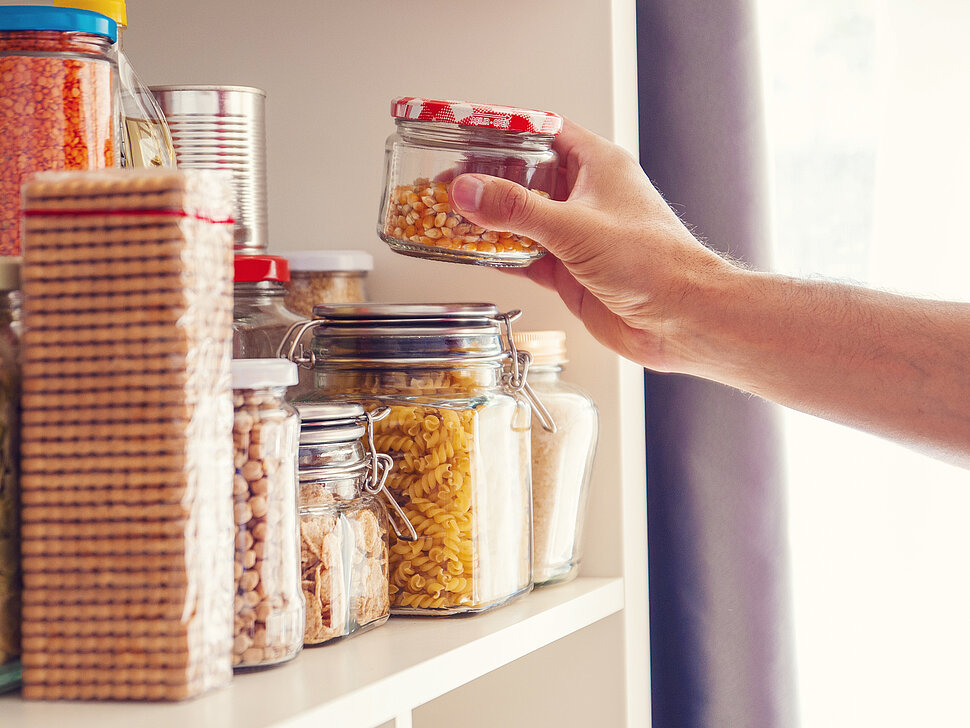Reading time: 6 min
Home Medical Kit & Hygiene: Stay Healthy in a Crisis
Falls, cuts, or burns when the pot full of boiling water for pasta slips out of someone’s hand – accidents at home happen every day. It’s wise to have a well-stocked home medical kit on hand for situations like these.
What Should My Home Medical Kit Contain?
Be it an accident at home, a fall from the bike, or a cold with a fever – with the right tools from your home medical kit, small injuries and minor illnesses can be treated quickly. And in more than just everyday life, in an emergency where you can’t leave your home or help can’t get there as quickly as usual, such tools are an important resource.
The following medications and materials should be included in every home medical kit:
Any personal medication prescribed by a doctor
Anti-pain and fever-reducing medication
Cold medications
Medication for diarrhea, nausea, and vomiting
Electrolytes, for replacing nutrients lost due to extreme diarrhea
Salves for insect bites and sunburn
Thermometer for measuring body temperature
Tweezers for removing splinters
Antiseptic wipes/disinfectant for external use
Wound disinfectant
Disposable gloves
Face mask
Bandages like those of a DIN 13164 first aid kit (first aid kit required for cars in Germany):
Gauze pads
Bandage scissors
Band-Aids and bandages of various types and sizes
Triangular bandage
To make sure you’re always ready if you or someone else needs help, ensure that your home medical kit is always fully stocked with the items listed above. We recommend restocking medications or bandages long before the supply has run out.
Some Medications in the Home Medical Kit Have Expired? Here’s How to Dispose of Them.
Medication that has expired should never stay in the home medical kit. Expired medication has not only lost its curative effect, but can even be dangerous to consume. It is best to regularly check the expiration dates of all medication in the kit and see what needs to be replaced. If certain items have expired, do not dispose of these in the toilet: depending on where you live, you can dispose of them in your household trash, at a pharmacy, at a recycling center, or at mobile collection points for hazardous materials. Visit arzneimittelentsorgung.de
to find out which location is the right one for where you live.
Home Medical Kit: 3 Tips for Storage
For your home medical kit, how and where you store it is just as important as what you put in it. The three points below are crucial to ensuring the contents stay effective and safe in the household:
Store all medication in a cupboard with a lockable compartment; store bandages in a freely accessible location
Make sure medication is stored in a childproof location: up high or in a locked location
Store the items in a cool and dry location – many medications and bandages should not be stored in the bathroom
Click here for a checklist on creating a home medical kit to download and print.
Hygiene and Water Supply in an Emergency
A home medical kit is an important tool for making sure people stay healthy during a crisis. The topic of hygiene is at least equally important, however. Even if it’s just construction work that damages the pipes and causes the water to get shut off. A power outage, too, can mean no water from the faucet. And the result? We can’t clean, shower, brush our teeth, or wash our hands as we usually do. This lack of hygiene can in turn lead to sickness.
But with preparation we can prevent this. Read on for how.
No Clean Water? Here’s What to Do.
Keep water stores: collect any water remaining in the pipes in large containers like the bathtub, sink, buckets, pots, etc.
Conserve water:
Use disposable dishes as these don’t need to be washed after
Use cleaning aids that don’t require water such as dry shampoo or hand-washing paste
Instead of washing hands, clean them with wet wipes or antiseptic wipes
For cleaning, use paper towels or wet wipes instead of running water
Use plastic gloves so your hands stay clean
Use a waterless camping toilet
Purify water for storage: treat water for use in personal hygiene with water purifier tablets/drops
Here’s How to Prepare for a Water Shortage
To ensure hygiene doesn’t suffer due to the lack of water, you should make sure to always have these items on hand:
Soap
Detergent
Toothpaste
Toothbrush
Wet wipes
Antiseptic wipes
Hygiene supplies (e.g. items for menstruation and diapers)
Toilet paper
Paper towels
Trash bags
Household gloves
Disinfectant
Camping toilet and extra bag and/or liquid
Water purification tablets/drops
More Information and Tips
In the article “How to prepare for disasters?”
put out by the German Federal Office of Civil Protection and Disaster Assistance you will find lots of other information on how to best prepare for emergencies.



